Publish Your Doctoral Research
by Janet Salmons, Phd, Research Community Manager for SAGE Methodspace. Dr. Salmons is the author of numerous SAGE books, as well as Publishing from your Doctoral Research: Create and Use a Publication Strategy with Dr. Helen Kara.
A webinar with Janet Salmons and three journal editors, Dr. Meng-Chuan Lai, Charles H. Sides, and Xiao-Jun Zhang.
Moving from Student Work to Career-Building Publications
You have many options for disseminating your research. In today’s multifaceted digital world it is important to consider which options will open doors to your desired academic or professional career, and how they fit together in a holistic publication strategy. For example, if you are aiming for an academic position where scholarly articles are the top priority, informal writings, podcasts or videos are still beneficial. If you want to publish a book, the time spent building an online presence will make a difference. When the book or article is published, you have an interested audience who will welcome this more substantial discussion of your research.
Sharing insights informally allows you to build your network and establish credibility as a knowledgeable expert. You might find others of like mind, discover your niche, your tribe, and perhaps meet potential co-authors or collaborative partners. A blog post in and of itself might seem insignificant but contributors to Methodspace, for example, are introduced to interested readers from across disciplines and around the globe who might not otherwise have encountered their work.
The map below illustrates some of the options, along with roles you need to take or accomplish with the help of a collaborative partner or specialist. Knowing your own abilities and limitations can help you avoid time-wasting frustration! For example, you might lack the technical skills needed for data visualization or the artistic skills needed to create figures or illustrations. Or, you might know how to create a podcast or blog post but would benefit by partnering with someone who has an established channel and audience.
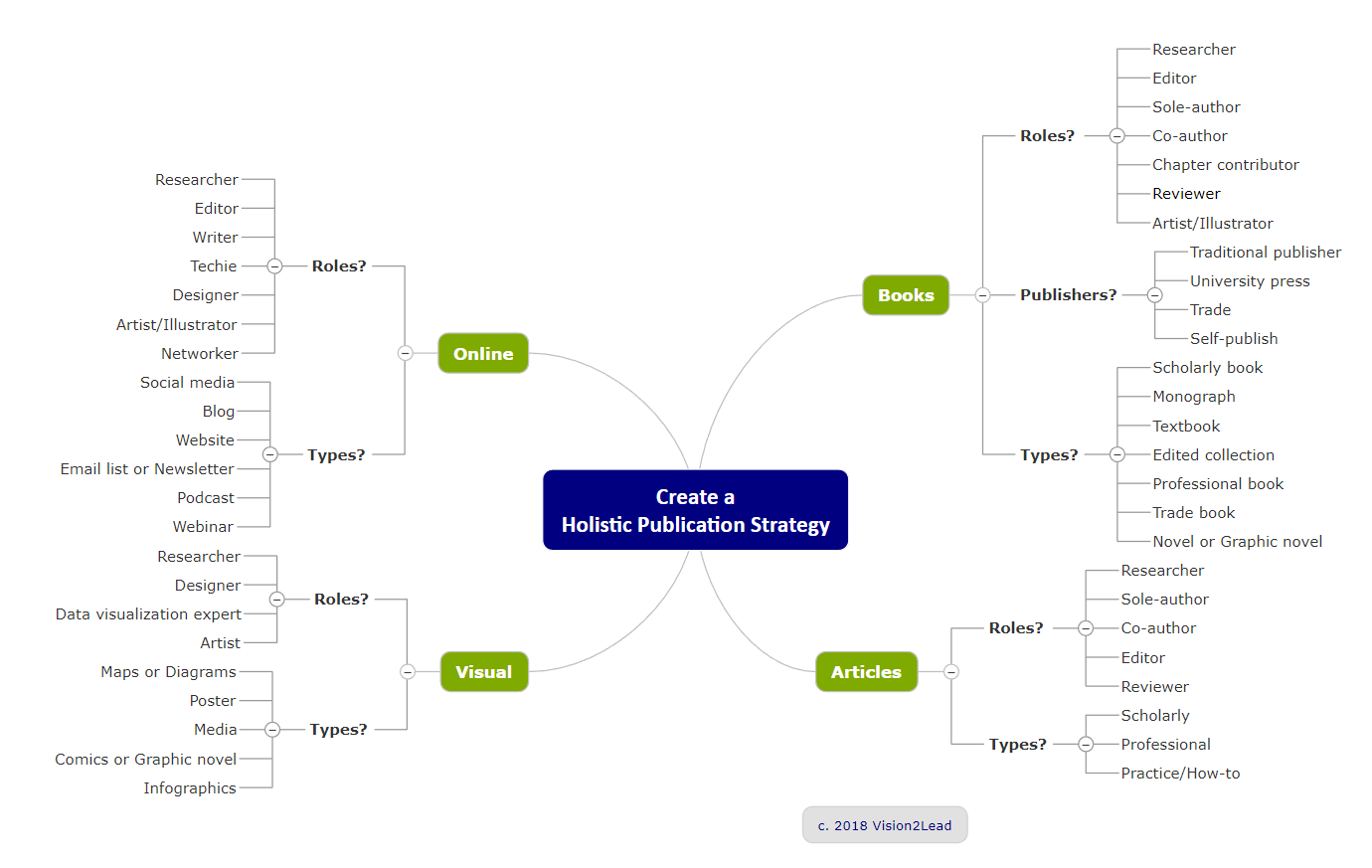
Use What You Have!
In the process of developing the final thesis or dissertation you produce a lot of writing as doctoral student. You undoubtedly have a hard drive full of research memos, notes, earlier versions, academic papers or reports, professional or creative writings, and presentations. Now what? It is not likely you will publish the thesis, dissertation or other pieces as is, in their entirety. Some amount of polishing will be needed to position the writing for an audience beyond your supervisor and institutional reviewers.
Instead, look at ways to use your best work. Can you extract a great problem description for a blog post or newsletter? Condense a lengthy section into a concise book chapter? Expand on idea to build a book-length text? Adapt your research for a different purpose, discipline, or context and discuss ideas in a podcast? Can you apply the recommendations from the study into a practical guide or handbook? When you take these possibilities into consideration, you will find new ways to utilize your doctoral work, thesis or dissertation.
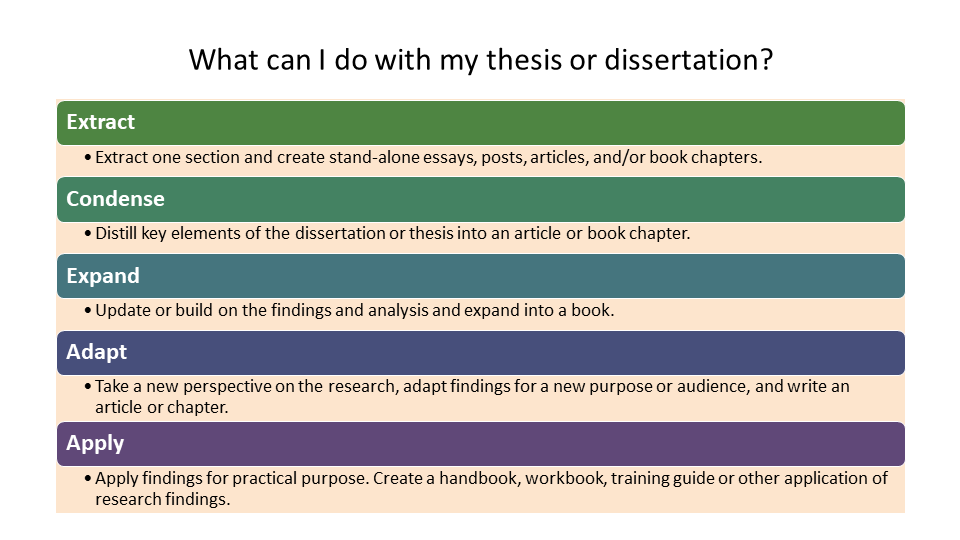
More Methodspace posts about Academic Writing
In this post Dr. Mazak discusses how to manage the writing process for a large project such as a dissertation, thesis, or book and offers resources to help new or experienced writers.
Celebrate Academic Writing Month 2023 by getting organized! Find open-access resources to help you avoid being distracted by details and lost files.
Dr. Linda Bloomberg offers detailed suggestions for getting organized and starting a dissertation or thesis.
Sometimes taking a break from the keyboard to write by hand unleashes creativity.
Maria Lahman offers tips to help you hone your academic writing
Find tips that will help you hone your writing.
This must-read article in The Scholarly Kitchen caught my attention: “Who Is Going to Make Money from Artificial Intelligence in Scholarly Communications?” See this thought-provoking interview with the author, Joseph Esposito.
Banned Books Week is a launchpad for an ongoing focus on factors that precede book bans or curricular restrictions, and implications for researchers and academic writers.
Marta Eichsteller offers tips for using and writing about biographical methods.
All the posts for Academic Writing Month 2022 are here on one page!
Learning while doing: collaborating on a book about collaboration.
Ethical decisions are present throughout the process of academic writing and publishing. This collection of open-access articles offers insights about some of the issues writers face.
Our context and identities influence how we think about our writing practice, our beliefs about time and boundaries, and so many other factors that have a real effect on us as academic writers.
Dr. Boyd was a panelist for the webinar, How Academic Writing Coaches Get Unstuck. In this post she responds to numerous questions posed by attendees, such as: “How to deal with shame about being very behind on a writing project?”
Dr. Boyd was a panelist for the webinar, How Academic Writing Coaches Get Unstuck. In this post she responds to a question posed by an attendee: “How do you find a writing group?
In addition to selling their well-known data analysis software, NVivo offers lots of free resources for qualitative and mixed methods researchers. They have a blog, a webinar series, and practical how-to videos. Find resources for academic writers whether or not you use their products.
In this podcast panelist Leslie Wang discusses “All About Writing Groups” and offers practical tips for organizing your own.
What do academics write when they are free from institutional constraints about what they can publish? See this post and conversation with Janet Salmons and Virginia Yonkers.
Listen to this conversation with Dr. Stu Shulman for discussion of implications of current developments for academics.
Dr. Boyd was a panelist for the webinar, How Academic Writing Coaches Get Unstuck. In this post she responds to questions posed by attendees: “How do you get unstuck in writing when someone's negative, hypercritical, or just mean feedback has gotten you stuck?” and “How do you balance or sustain your writing with all the imposter syndrome thoughts coming at you?
Dr. Boyd was a panelist for the webinar, How Academic Writing Coaches Get Unstuck. In this post she responds to questions posed by attendees: “How do you get unstuck in writing when someone's negative, hypercritical, or just mean feedback has gotten you stuck?” and “How do you balance or sustain your writing with all the imposter syndrome thoughts coming at you?
Since I am advocating for ways to stay engaged with writing, drifting may seem a strange interlude. Yet, I find drifting to be a vital companion state to writing. For me, usually drifting occurs when I have set aside all devices and am absorbed in some wholly different task, such as gardening, chauffeuring or waiting for children, or simply watching birds congregate at the feeder.
We kicked off this year’s AcWriMo with a webinar that featured three professional coaches. View the recording here, and check back for more posts from the panelists and answers to questions posed during the webinar.
Where do you start when the blank page is staring at you? Answer these key questions to get started!
Find coming events and recordings of past webinars in this series about getting published.
Find food for thought and strategies for action this AcWriMo on SAGE Methodspace.




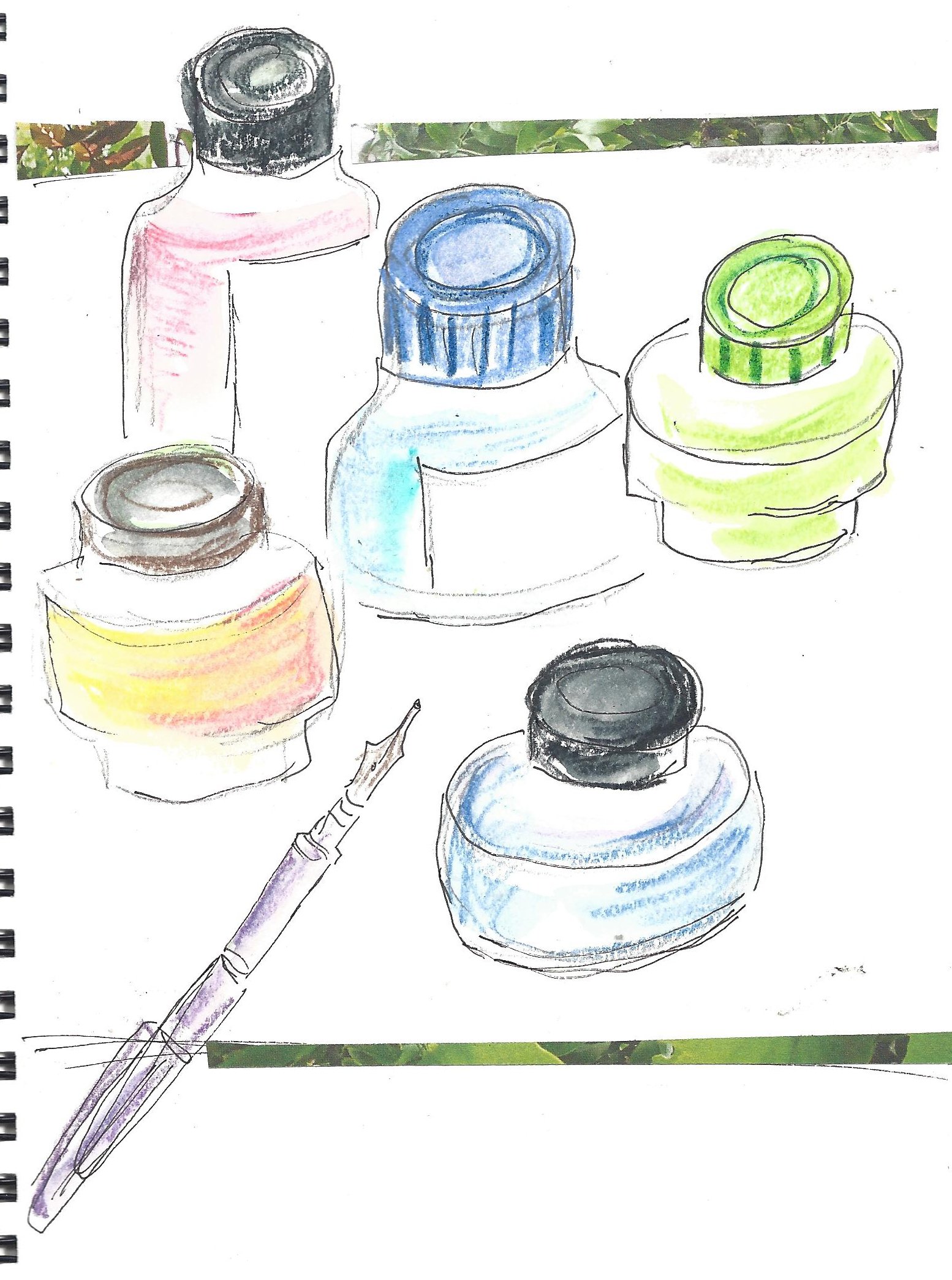




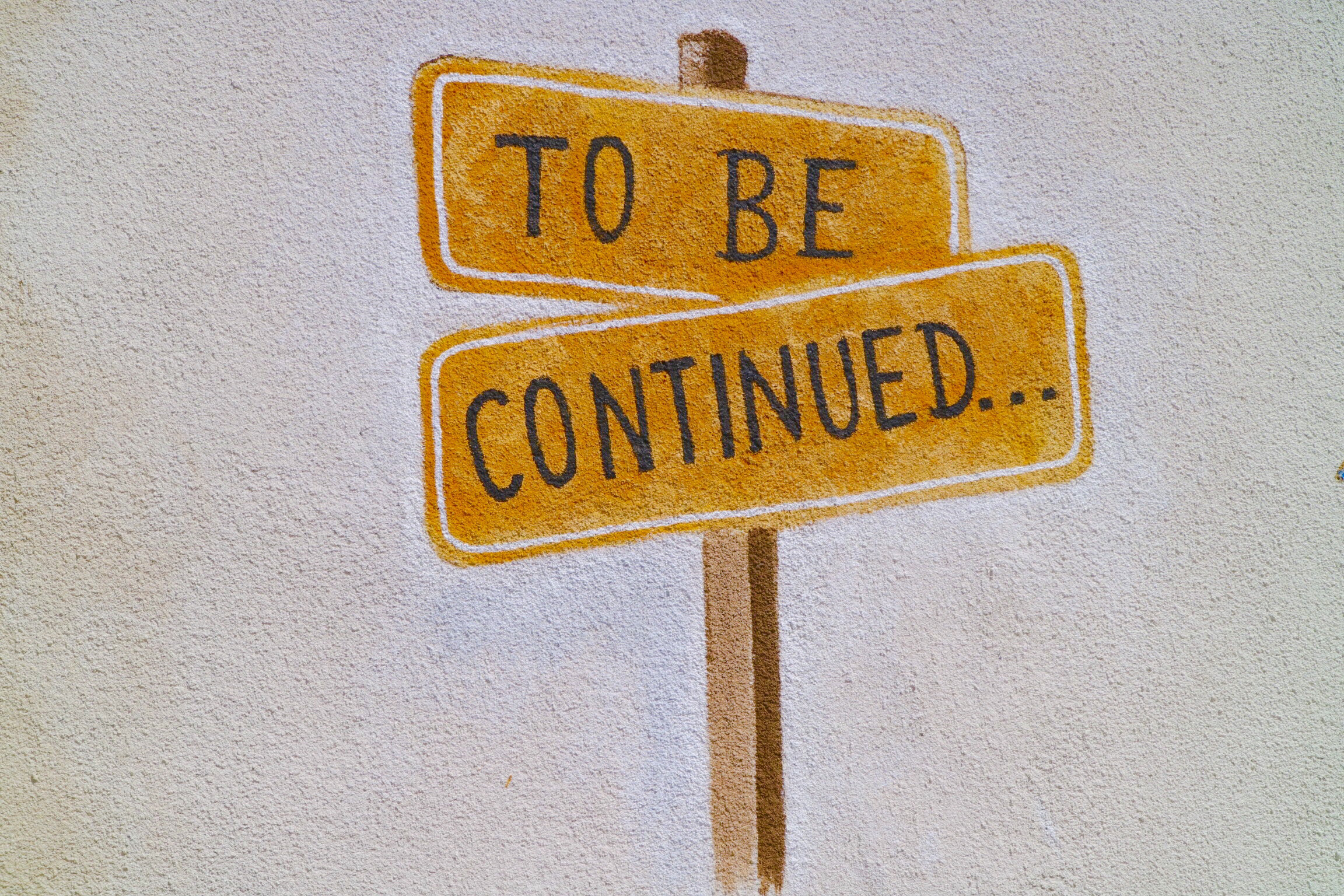








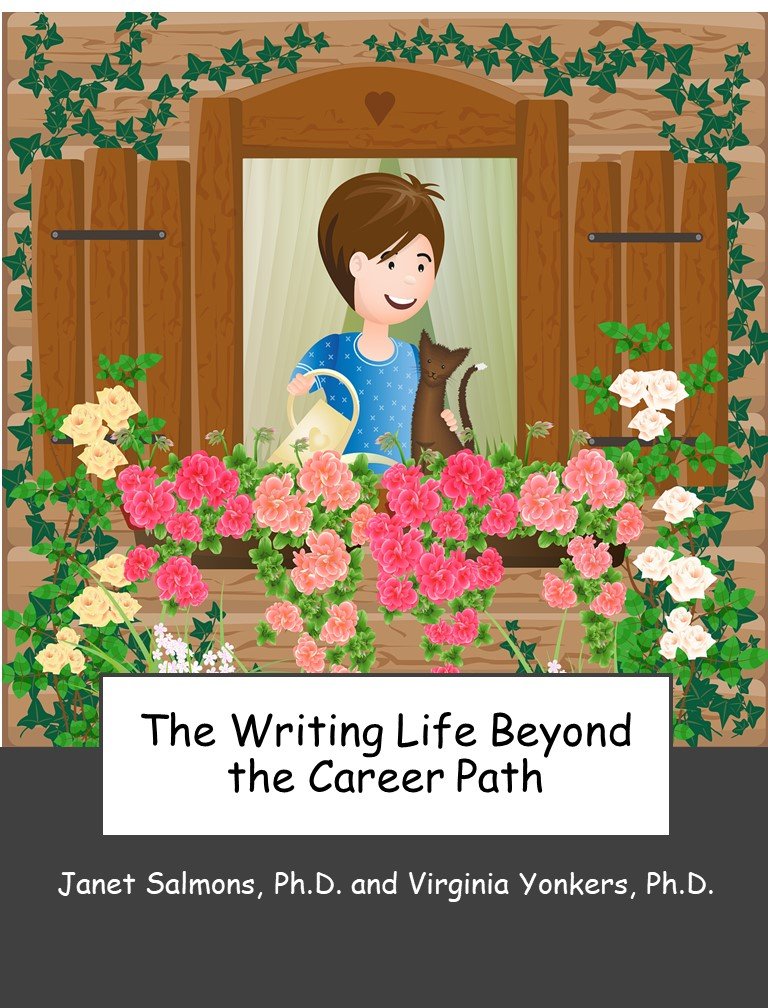








Michelle Boyd answers a question about taking small steps to make progress on a large writing project.